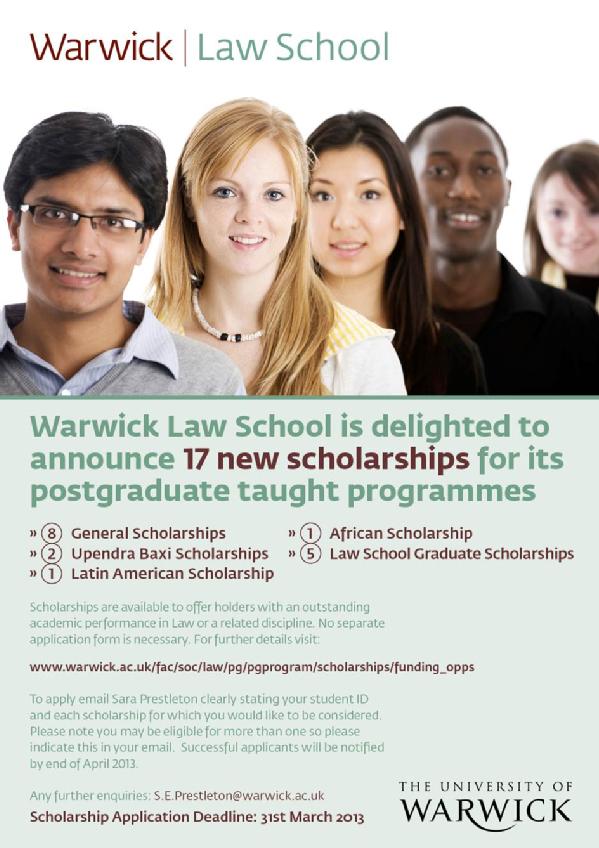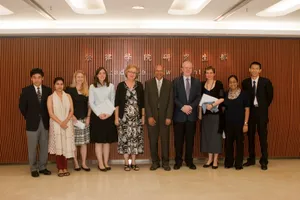Warwick Law School News
Warwick Law School News
The latest updates from our department
Jackie Hodgson elected to governing Council of JUSTICE
In October 2013 Jackie was elected to the governing Council of JUSTICE, the all-party law reform and human rights organisation.
JUSTICE (www.justice.org.uk ) works largely through policy-orientated research; interventions in court proceedings; education and training; briefings, lobbying and policy advice. It is the British section of the International Commission of Jurists (ICJ).
JUSTICE also has a Student Human Rights Network (www.justice.org.uk/shrn_home.php ), an online forum that aims to encourage interest in, and improve awareness of, human rights.
Kimberley Brownlee wins Early-Career Fellowship
The Early-Career Fellowship from the Independent Social Research Foundation (worth £48,000) provides funds for 12 months to enable a researcher to do interdisciplinary work that takes new approaches and suggests new solutions to real world social problems. Kim's project will focus on the ethics of sociability, the evils of social deprivation, and the merits of social human rights. In particular, it will look at the human rights implications of socially privative environments such as long-term solitary confinement in prison.
To find out more click here: http://www.isrf.org/grant-competitions/
Octavio Ferraz continues work for World Bank as an expert on right to health litigation in Brazil
Octavio Ferraz continues his work for the World Bank as an expert on right to health litigation in Brazil. After writing his report on this topic he will now to give a presentation on Webinar.
|
Webinars |
|
|
Health litigation in Brazil: an effective tool for social change? Associate Professor of Law, University of Warwick, |
|
|
In the past two decades Brazil has experienced a surge in right to health litigation, with thousands of claims reaching the courts every year demanding the enforcement of the right to health against the state. After years of empirical research, Octavio Ferraz examines whether increased or not litigation is a positive and if in fact the prosecution of health is an effective tool for social change. Learn more |
|
Jayan Nayar gives public Lecture to Malaysian Bar Council
Lynas, the Law and the People: What’s Temporary and Permanent about “Licence”?
(Friday, 4 January 2013)
Abstract
The ongoing saga of the Lynas Rare Earth processing plant in Gebeng may be read in many different ways. It may be viewed as a conflict between the developmental priorities of the Malaysian government keen to enhance its export earning through Foreign Direct Investment arrangements and the environmental and health concerns of local and national sectors of the population weary of such ventures into hazardous industries. Or, it might be understood as a conflict between the commercial motivations of profit and economic opportunities of a multinational company (through its local subsidiary) and the values of environmental protection. Differently, we may read the conflict as one pertaining to issues of transparency and accountability, of technical best-practice and stringent enforcement of environmental regulations, of government policy-making and public participation. Variously, these many issues may be seen to underlie the still on-going legal challenge surrounding the grant of the Temporary Operation Licence to Lynas Malaysia Sdn. Bhd.
This presentation does not seek to repeat the legal arguments along the lines of conflict mentioned above. The focus of the talk will instead be twofold: first, to interrogate the ‘identity’ and meaning of the three social ‘institutions’ involved - Lynas, the law (and by implication the state), and the ‘people’ – as they emerge, find expression, and are discursively constructed in the conflict. Secondly, to explore the wider implications of the notion of ‘license’ that go beyond its limited scope in terms of the TOL dispute. What is revealed from this different reading of the story of Lynas, The Law, and The People, are more pressing questions regarding the nature of the geography and distribution of rights, responsibilities, privileges and risks associated with differentiated 'citizenship' in a globalised political economy, and on the varying consequences of the 'temporary' and the 'permanent', of located and dislocated temporality, that follow from the affirmations of 'licence', on the one hand, and the imposition of containments/bans, on the other. From this understanding of the present contexts of variegated 'citizenship', some preliminary (and perhaps provocative) thoughts might be put forward on the politics of encounter between the 'corporation' and the 'people' within globalised states.
Law School offers 16 Scholarships for Postgraduate Study
Scholarships
Warwick law School has a range of scholarships available for its LLM scholarships in Advanced Legal Studies; International Development Law and Human rights; International Economic Law and International Corporate Governance and Financial Regulation
For further information contact S.E.Prestleton@warwick.ac.uk or visit http://www2.warwick.ac.uk/fac/soc/law/pg/pgprogram/scholarships/funding_opps
Scholarship Closing Date: 31st March 2013
For more information see link below
http://www2.warwick.ac.uk/fac/soc/law/pg/pgprogram/scholarships/funding_opps
and
http://www2.warwick.ac.uk/insite/news/intnews2/scholarships_indian_students

New Book: Andrew Williams "A Very British Killing"

On September 15, 2003 Baha Mousa, a hotel receptionist, was killed by British Army troops in Iraq. He had been arrested the previous day in Basra and was taken to a military base for questioning. For forty-eight hours he and nine other innocent civilians had their heads encased in sandbags and their wrists bound by plastic handcuffs and had been kicked and punched with sustained cruelty. A succession of guards and casual army visitors took pleasure in beating the Iraqis, humiliating them, forcing them into stress positions in temperatures up to 50 degrees Centigrade, and watching them suffer in the dirty concrete building where they were held. Other soldiers, officers, medics, the padre, did not take part in the violence but they saw what was happening and did nothing to stop it. Some knew it was wrong. Some weren't sure. Some were too scared to intervene. But none said anything or enough until it was far too late and Baha Mousa had been beaten to death.
This book tells the inside story of these crimes and their aftermath. It examines the institutional brutality, the bureaucratic apathy, the flawed military police inquiry and the farcical court martial that attempted to hold people criminally responsible. Even though a full public inquiry reported its findings into the crimes in September 2011, its mandate restricted what it could say. The full story, told with the power of a true-crime expose, shows how this was not simply about a few bad men or 'rotten apples'. It shines a light on all those involved in the crime and its investigation, from the lowest squaddie to the elite of the army and politicians in Cabinet.
Professor Abdul Paliwala appointed as international adviser to the Centre for Rights and Justice at the Chinese University of Hong Kong.
Professor Abdul Paliwala appointed as international adviser to the Centre for Rights and Justice at the Chinese University of Hong Kong.

